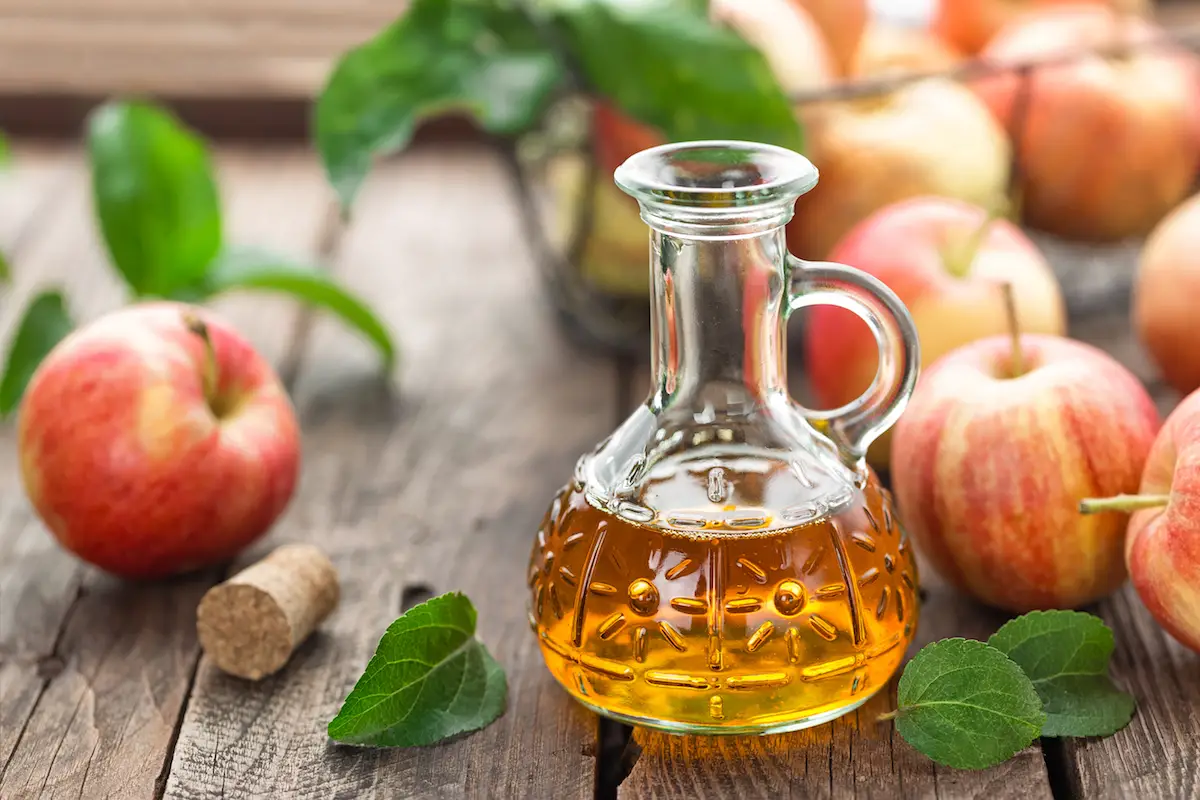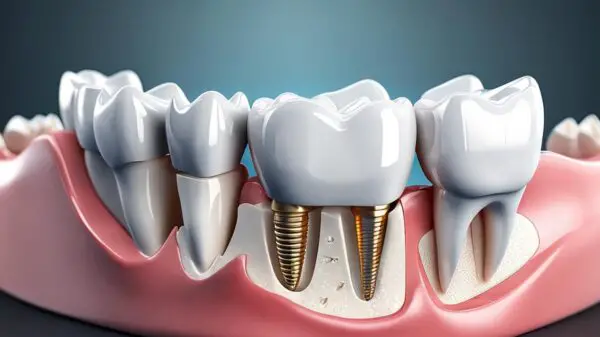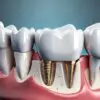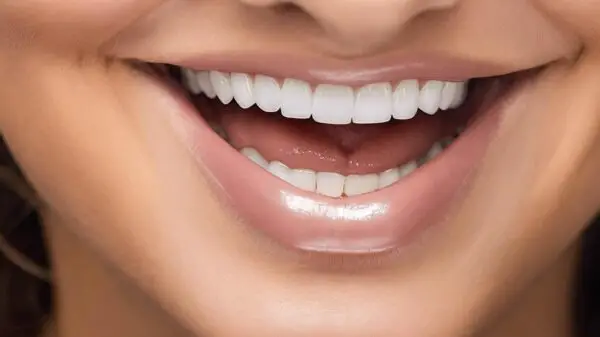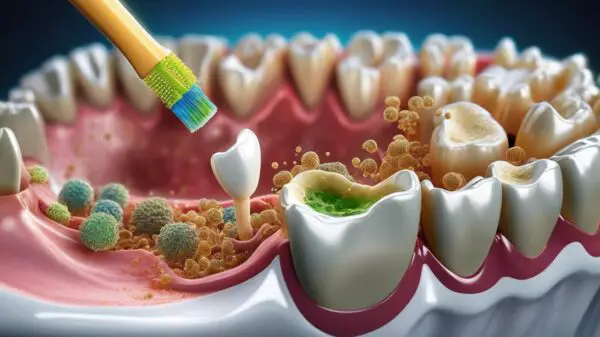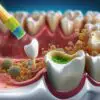Is Apple Cider Vinegar Bad For Your Teeth?
Apple cider vinegar has been used for centuries to treat various medical conditions. However, it is also gaining popularity as a health supplement. This is because it is an incredibly versatile supplement with numerous potential health benefits, so it’s no wonder why so many people are buying bottles or pills for health reasons. However, there are many people who have questions about it with a common one being, is apple cider vinegar bad for your teeth?
Apple cider vinegar is high in acidity, and so consuming too much can damage your teeth. However, apple cider vinegar can still be safely consumed if done so properly by diluting it with water whenever you drink it, rinsing or gargling afterward with plain water, and brushing and flossing your teeth after consuming.
To learn more about apple cider vinegar, its health benefits, and how to properly use it and take care of your teeth, keep reading this blog post!

Benefits of Apple Cider Vinegar
You may know several people that rave about it or have mentioned starting to use it. Why is it so popular, though? Here are seven reasons why people choose to consume apple cider vinegar:
1. It may aid in digestion
Apple cider vinegar contains acetic acid, which can help break down food and make nutrients more absorbable in the body. The vinegar’s probiotic content can also support good bacteria in your gut, which encourages healthy digestion.
2. It helps regulate blood sugar levels
Studies have found that consuming apple cider vinegar may reduce blood sugar spikes after meals and improve insulin sensitivity in those with type 2 diabetes.
3. It may be helpful for weight loss
Research suggests that consuming apple cider vinegar may increase feelings of fullness and reduce overall calorie intake. Additionally, it has been shown to improve metabolism and promote fat burning.
4. It can be used as a detoxifier
Apple cider vinegar contains compounds that help the body break down toxins and flush them from the system, which can help reduce inflammation and support overall health.
5. It is rich in antioxidants
Antioxidants are essential for fighting free radical damage in the body, and apple cider vinegar is full of them! The fermented drink contains vitamins A, C, E, B1, B2, B6, niacin, and folic acid, which all have antioxidant properties.
6. It works as a natural skin toner
Apple cider vinegar can be used as a natural skin toner to reduce blemishes and age spots, improve elasticity and add brightness to your complexion.
7. It is beneficial for oral health
Apple cider vinegar has antimicrobial properties that inhibit the growth of bacteria in the mouth, making it an effective natural remedy for bad breath and other oral issues.
All in all, apple cider vinegar is an incredibly versatile supplement with numerous potential health benefits. No wonder so many people are buying bottles or pills for health reasons.
How to Use Apple Cider Vinegar & Take Care of Your Teeth
Apple cider vinegar is becoming increasingly popular for its many health benefits, but some people are concerned about the potential for it to damage their teeth. While it’s true that apple cider vinegar is acidic and too much acidic foods can cause enamel damage, there are ways you can use it safely and protect your smile from any potential harm.
When using apple cider vinegar, make sure to dilute it with water. This reduces the acidity level of the vinegar and helps protect your enamel from eroding away too quickly. It’s also important to rinse your mouth with plain water after drinking a glass of diluted apple cider vinegar or gargling with it. Additionally, wait an hour before brushing your teeth after consuming apple cider vinegar, as it can soften your enamel and make brushing more abrasive.
It’s also essential to take care of your teeth when using apple cider vinegar. Make sure you brush twice daily with a fluoride toothpaste, floss regularly, and visit the dentist every six months for a professional cleaning and check-up. Doing so will help protect your teeth from any potential damage caused by Apple Cider Vinegar.
Essentially, while there is some concern about the acidity of apple cider vinegar damaging your teeth, it can still be safely consumed if done so properly. Be sure to dilute it with water whenever you drink it, rinse or gargle afterward with plain water, wait an hour before brushing your teeth after consuming, and take proper care of your teeth. Doing so will help ensure that any potential damage caused by apple cider vinegar can be avoided and you can safely enjoy all its health benefits.

Does Diluting It Minimize the Effectiveness?
When it comes to apple cider vinegar, dilution is not always a bad thing. Diluting apple cider vinegar can actually help minimize its negative side effects while still reaping the benefits of its healthful properties.
The recommended ratio of apple cider vinegar to water is one part of the condiment to five parts water. Drinking this diluted mix provides you with all the benefits of apple cider vinegar without experiencing any of its negative effects. The dilution also makes it easier for your body to absorb and use the healthful components found in apple cider vinegar, such as vitamins A and C, potassium, and pectin.
Furthermore, diluting apple cider vinegar can help it become more palatable for those who find its taste too strong; plus, it will reduce the risk of upsetting your stomach if consumed on an empty stomach or too quickly.

What If I Use a Straw?
Many people opt for using a straw when consuming vinegar in order to help reduce the contact between the drink and their tooth enamel. So does using a straw make apple cider vinegar hurt your teeth any less? The short answer is yes, although you should still practice caution when consuming vinegar regardless of how you are doing so. Since apple cider vinegar is highly acidic with a pH level of around 3-4, it can still cause wear and tear on your teeth even if consumed through a straw. Therefore, it is important to take steps to protect your teeth and enamel even when using a straw.
Are There Other Options Regarding Weight Loss?
When it comes to weight loss, apple cider vinegar is often touted as a miracle remedy. It’s said to boost metabolism and suppress appetite, helping you drop pounds quickly. But we have already discussed that apple cider vinegar can be harsh on your teeth. Its acidic nature erodes enamel and may cause other dental problems if consumed in large amounts over time. Fortunately, there are several alternatives you can use for weight loss without damaging your teeth in the process. Here are some of our top picks:
1. Balsamic Vinegar
This type of vinegar has a pleasant taste and offers many of the same health benefits as apple cider vinegar without the harshness on your teeth. Balsamic vinegar contains antioxidants that help reduce inflammation and improve digestion, which can assist with weight loss.
2. Lemon Juice
Lemons are naturally acidic and provide many of the same health benefits as apple cider vinegar. They help boost metabolism, reduce water retention, and suppress appetite when consumed before meals. Plus, lemon juice has a much lower acidity than ACV, so it won’t damage your teeth over time.
3. Coconut Oil
This type of oil is versatile and highly nutritious. It’s also rich in fatty acids that can boost metabolism and help you lose weight more easily. And because coconut oil isn’t acidic like apple cider vinegar or lemon juice, it won’t cause any harm to your teeth no matter how much you consume!
Conclusion
The acetic acid content of apple cider vinegar can be very powerful. So and, when used in excess, can result in several negative side effects. It is best to consult with a dental professional before consuming apple cider vinegar or applying it topically to ensure that the user is making an informed decision regarding their health and well-being.



